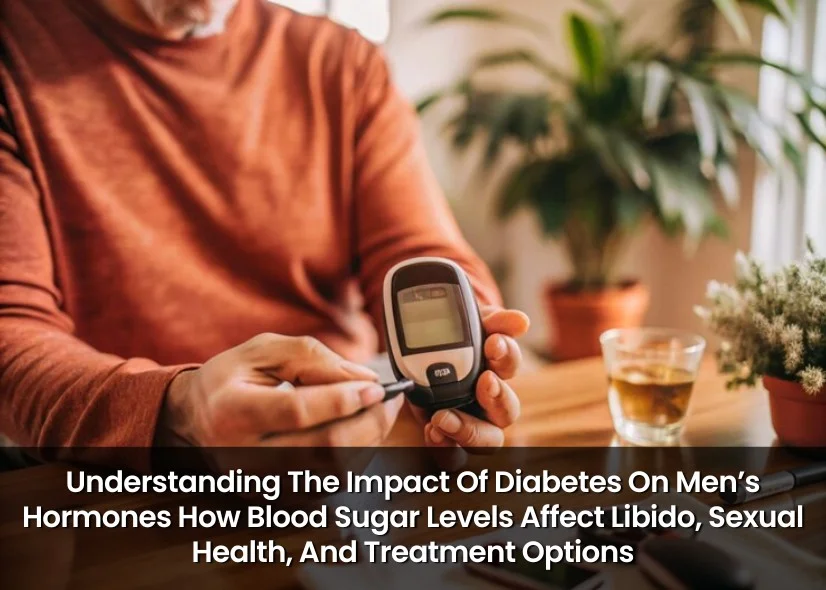The Hormonal Landscape In Diabetes
In men, testosterone is the primary male sex hormone responsible for several functions, including libido, energy levels, muscle mass, and mood regulation. Diabetes, particularly type 2 diabetes, is commonly associated with hormonal imbalances, particularly lower testosterone levels. Studies have shown that men with diabetes are more likely to experience testosterone deficiency, which can have profound implications for their overall health and well-being.
1. The Role of Insulin Resistance
One of the hallmark features of type 2 diabetes is insulin resistance, where the body’s cells do not respond effectively to insulin. Insulin is not only essential for glucose metabolism but also plays a role in hormone regulation. When insulin levels are high due to insulin resistance, it can lead to elevated estrogen levels and reduced testosterone levels, further contributing to hormonal imbalance.
2. Obesity and Hormonal Disruption
Obesity is often a contributing factor to type 2 diabetes and significantly impacts hormone levels. Excess fat, particularly visceral fat around the abdomen, can convert testosterone into estrogen through a process called aromatization. This conversion leads to lower testosterone levels, which can reduce libido and impair sexual function.
The Effects Of Diabetes On Libido And Sexual Health
The interplay between diabetes and hormone levels directly affects men’s sexual health in several ways:
1. Decreased Libido
Low testosterone levels are commonly associated with a reduced interest in sexual activity, or libido. Men with diabetes may find themselves experiencing a decline in sexual desire, which can lead to frustration and strain in relationships.
2. Erectile Dysfunction (ED)
Erectile dysfunction is another prevalent issue for men with diabetes. High blood sugar levels can damage blood vessels and nerves, impeding blood flow to the penis, which is essential for achieving and maintaining an erection. Additionally, the hormonal imbalance caused by diabetes exacerbates this condition, creating a cycle of sexual dysfunction.
3. Psychological Factors
The emotional toll of managing diabetes, including stress and anxiety about health, can further diminish libido and complicate sexual health. Men may experience feelings of inadequacy or embarrassment, leading to a decrease in confidence regarding their sexual performance.
Treatment Options For Improving Sexual Health
Addressing the impact of diabetes on hormones and sexual health involves a multi-faceted approach:
1. Blood Sugar Management
The cornerstone of managing diabetes and its associated complications is effective blood sugar control. Maintaining stable glucose levels through medication, diet, and exercise can help prevent hormonal imbalances and reduce the risk of sexual health issues. Regular monitoring and working closely with healthcare providers are essential in this regard.
2. Lifestyle Modifications
- Healthy Eating
A balanced diet rich in whole grains, lean proteins, healthy fats, and plenty of fruits and vegetables can support blood sugar control and overall health. Reducing sugar and refined carbohydrates is particularly crucial for managing diabetes effectively. - Physical Activity
Regular exercise helps improve insulin sensitivity and can contribute to weight loss, both of which are beneficial for hormonal balance. Physical activity also enhances blood flow and can improve erectile function.
3. Hormone Replacement Therapy (HRT)
For men experiencing significantly low testosterone levels, hormone replacement therapy may be a viable option. HRT can help restore testosterone levels, enhancing libido, energy, and overall quality of life. However, this treatment should only be pursued under the guidance of a healthcare provider, who can assess the risks and benefits.
4. Medications for Erectile Dysfunction
Various medications, such as phosphodiesterase type 5 inhibitors (e.g., sildenafil, tadalafil), can be prescribed to help manage erectile dysfunction. These medications enhance blood flow to the penis, assisting men in achieving and sustaining erections.
5. Psychological Support
Counseling or therapy can be beneficial for men dealing with the emotional aspects of diabetes and sexual dysfunction. Addressing stress, anxiety, and relationship issues can improve overall sexual health and satisfaction.

